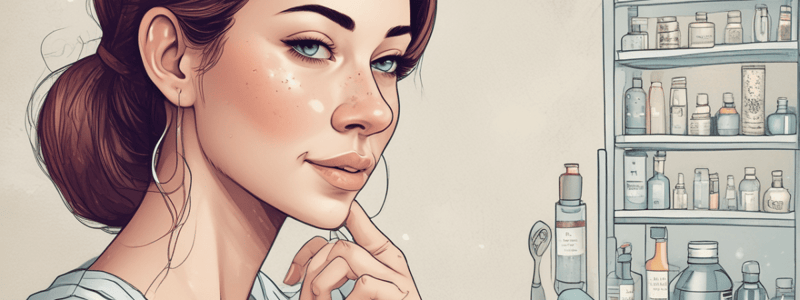Podcast
Questions and Answers
Which of these glucocorticoid forms has the highest absorption?
Which of these glucocorticoid forms has the highest absorption?
- Gels
- Creams
- Ointments (correct)
What is the first line treatment for mild to moderate acne?
What is the first line treatment for mild to moderate acne?
- Isotretinoin
- Retinoids
- Benzoyl peroxide (correct)
Sunscreen SPF protects against both UVA and UVB rays.
Sunscreen SPF protects against both UVA and UVB rays.
False (B)
What is the mainline treatment for psoriasis?
What is the mainline treatment for psoriasis?
Impetigo is a staph infection seen in children aged ___ to ___.
Impetigo is a staph infection seen in children aged ___ to ___.
What type of drug is fluorouracil used for treating?
What type of drug is fluorouracil used for treating?
What are the common side effects of retinoids?
What are the common side effects of retinoids?
What is the normal total serum calcium level in mg?
What is the normal total serum calcium level in mg?
Which of the following is a risk associated with isotretinoin?
Which of the following is a risk associated with isotretinoin?
Osteoporosis is primarily treated with glucocorticoids.
Osteoporosis is primarily treated with glucocorticoids.
Calcium is regulated by ___ and ___ hormones.
Calcium is regulated by ___ and ___ hormones.
What is the treatment for hypoparathyroidism?
What is the treatment for hypoparathyroidism?
What condition is caused by vitamin D deficiency in children?
What condition is caused by vitamin D deficiency in children?
What type of drug is denosumab?
What type of drug is denosumab?
Bisphosphonates can lead to osteonecrosis of the jaw.
Bisphosphonates can lead to osteonecrosis of the jaw.
Flashcards are hidden until you start studying
Study Notes
Glucocorticoids
- Highest absorption is through ointments
- Creams are suitable for inflamed or dry skin
- Gels are suitable for oily skin
- Adverse effects include growth retardation in kids, adrenal suppression, and systemic toxicity with long-term therapy
Acne Treatment
- Benzoyl peroxide is the first line of treatment for mild to moderate acne
- Retinoids should be used every other day initially and then daily, with precautions for redness, peeling, and dry skin, and photosensitivity (sunscreen is essential)
- Antibiotics of choice are Doxy and minocycline, with alternatives being Tetra and erythromycin
- Isotretinoin is only for nodular cystic acne, with strict risk management, including two pregnancy tests prior to starting, two forms of birth control, and monthly pregnancy tests
- Hormonal treatments include oral contraceptives and spironolactone, which blocks aldosterone and sex hormones
Sunscreen
- SPF protects against UVB, not UVA
- To get both UVA and UVB protection, sunscreen must contain avobenzene and state the range of UV protection and water/sweat resistance on the bottle
Psoriasis
- Topical treatments include glucocorticoids, vitamin D analogs (calcipotriene), vitamin A derivatives (tazarotene), anthralin (dithrocream), and tars (coal tar)
- Systemic treatments include immunologics (methotrexate, acitretin, glucocorticoids, cyclosporine), biologics (etanercept, mab's), and procedures (photochemotherapy)
Actinic Keratoses
- These are rough, scaly, red/brown papules caused by chronic sun exposure
- Treatments include fluorouracil, diclofenac, imiquimod, and amino acid with blue light
Atopic Dermatitis (Eczema)
- These patients often have asthma
- Glucocorticoids are the main treatment
- Topical immunosuppressants include tacrolimus and pimecrolimus, with caution about cancer and lymphoma
- Crisaborole 2% ointment is used when steroids cannot be used, and is for patients over 3 months old
- Monoclonal antibodies include dupilumab injection (expensive) for patients over 6 months old
- Jak inhibitors include topical Ruxolitinib 1.5% cream for mild to moderate cases, with caution about infections and malignancies, and oral upadacitinib and abrocitinib for severe cases over 12 months old
Warts
- Common warts are caused by HPV, with genital warts caused by HPV 6 and 11
- Treatments include cryotherapy or topical imiquimod, podofilox, and kune at home
Impetigo
- This is a staph infection in kids aged 2-5, characterized by a honey-colored crust
- Treatments include antibiotics (cephalexin, dicloxacillin, clindamycin, and amoxicillin-clavulanate), topical mupirocin and retapamulin, and the new drug ozenoxacin
Metabolic Bone Disease
- Osteoclasts break down bone, while osteoblasts deposit new bone
- Blood calcium levels are regulated by parathyroid hormone and vitamin D
- Elevated calcium levels may indicate hyperparathyroidism or cancer
- Calcium absorption occurs in the small intestine and is increased by parathyroid hormone and vitamin D, but decreased by glucocorticoids
- Calcium excretion is decreased by parathyroid hormone, vitamin D, and thiazide, but increased by loop diuretics, calcitonin, and sodium loading
Disorders Involving Calcium
- Rickets is a vitamin D deficiency in children, causing soft bones and deformity, and is treated with supplements
- Osteomalacia is the adult counterpart, also caused by a lack of vitamin D, and is treated with supplements
- Hypoparathyroidism is caused by the inadvertent removal of the parathyroid gland, leading to hypocalcemia, and is treated with calcium supplements
- Hyperparathyroidism is caused by a benign adenoma, leading to hypercalcemia and hypophosphatemia, and is treated with surgery to remove the parathyroid glands or calcium-lowering drugs like cinacalcet
Osteoporosis
- The goal is to prevent fractures
- Prevention strategies include weight-bearing exercise, calcium and vitamin D supplements, smoking cessation, avoiding excessive alcohol, and avoiding glucocorticoids and thyroid regulation
- Screening is recommended for those over 65 years old
- Treatments include calcitonin, bisphosphonates, SERMs, teriparatide, denosumab, and sclerostin inhibitors
- Bisphosphonates, such as alendronate, risedronate, ibandronate, and zoledronate, inhibit bone resorption and are the main treatment, but have adverse effects like osteonecrosis of the jaw, femur fracture, afib, hyperpara, and esophageal cancer
Studying That Suits You
Use AI to generate personalized quizzes and flashcards to suit your learning preferences.




